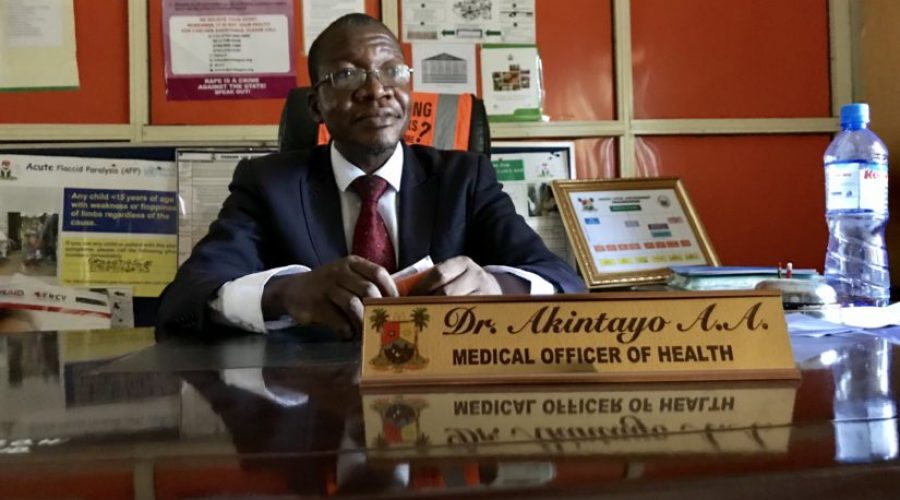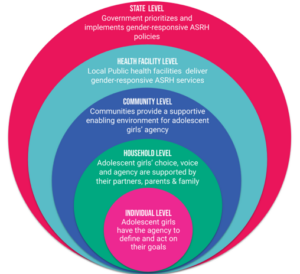By Emma Beck, Associate Communications Manager, PSI
“Ignorance kills,” Dr. Akintoba Adebayo Akintayo says gravely. “We cannot ignore adolescent health.”
He shuffles documents piled on his wooden desk.
“I have seen girls get pregnant [without] someone to turn to about their difficulties.”
Dr. Akintayo raises his fingers one-by-one as he lists the complications these girls too often experience.
Maternal mortality.
Child mortality.
Financial implications for the girl, her family and her community.
As the Medical Officer of Health for Lagos’s Agege Local Government, Dr. Akintayo is tasked with paving critical pathways for young people to access sexual and reproductive health (SRH) services.
But in a culture flooded with entrenched taboos surrounding contraception and with a health system that does not always have clear avenues for adolescents to access SRH information and services, Dr. Akintayo knows that finding new, innovative approaches to serve his district’s youth remains imperative. In 20 months:
- 69,254+ girls aged 15- to 19-have voluntarily taken up a modern contraceptive method
- 7 in 10 girls who engage with 9ja Girls take up a method
- 7 in 10 choose a long-acting method
The insights that have driven our impact? We’ve got you covered. Just click below.
*Data from Jan. 2018-Sept. 2019. According to the Demographic Health Survey, 23 percent of girls in southern Nigeria give birth by the age of 19. Some three in 10 girls aged 15-19 want but don’t, for a myriad of reasons, have access to modern contraception. And across the nation, one in four pregnancies among girls in this age group will end in an abortion, many of which are unsafe.
Adolescents 360 (A360)’s 9ja Girls – an adolescent and youth SRH program powered by PSI and implemented by the Society for Family Health— is working to change this reality. The program works in partnership with public health facilities and alongside young people themselves to deliver government representatives like Dr. Akintayo a solution to reimagine how girls aged 15-19 perceive and access modern contraception. For Dr. Akintayo, this is personal.
“I talk to my own [daughters] about everything when it comes to their reproductive health. In the kitchen, in the living room. They’ll laugh,” he chuckles. “But I tell them sternly; this is serious.”
Giving Girls a Chance to Dream
Saturday is a girls’ day at the local primary health clinic.
It’s here that 9ja Girls’ Life, Love and Health (LLH) classes run once weekly, transforming the health clinic for a morning dedicated wholly to girls. LLH engages girls in dialogue to identify their dreams and how they can achieve them, including how to use tools to prevent an unplanned pregnancy.
A 9ja Girls embedded, youth-friendly provider leads private contraceptive counseling; all counseling addresses girls’ expressed concerns, including the potential for side effects and the assurance that all contraceptive methods are safe and reversible. From January 2018 through September 2019, 9ja Girls has worked in nine Nigerian states to serve more than 69,254 15- to 19-year-old girls with modern contraception. Roughly seven in 10 girls who engage with 9ja Girls voluntarily adopts a method, and about seven in 10 choose a long-acting method.
“My dream is to see all girls [achieve] their own potential,” Dr. Akintayo says. “9ja Girls is helping us implement and fill gaps in our adolescent and youth SRH policy and ensure girls’ brighter futures ahead. I am convinced 9ja Girls is the way forward.”
And will his daughters go through 9ja Girls?
“Yes!” his hands swing in motion. “Why ever not?! When it comes contraceptive counseling for young people, we know: choice is key, and leading with what matters to young people is integral to making contraception relevant, valuable and accessible to girls’ lives.
That’s why 9ja Girls embeds, youth-friendly providers to lead private contraceptive counseling. All contraceptive counseling addresses girls’ expressed concerns, including the potential for side effects and the assurance that all contraceptive methods are safe and reversible.
What have we learned – and what can you apply – about training youth-friendly providers? We’ve captured it all in the link below.




